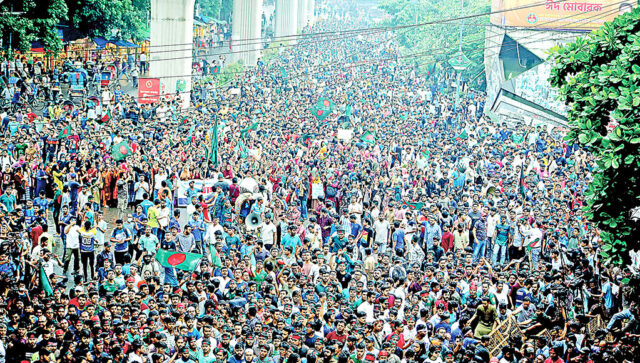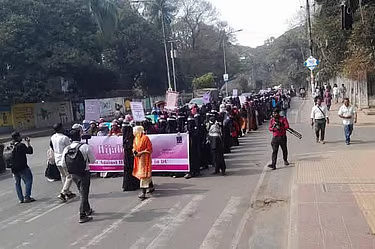THIS is not the piece I intended to write just 24 hours ago (August 4). As Dinah Washington once famously sang, lyrics taken from the 1934 original ‘Cuando vuelva a tu lado’ by the Mexican songwriter Maria Grever, ‘what a difference a day makes’.
I had originally started my piece with the words ‘the situation in Bangladesh is a cause for concern’. I wrote, it is a cause for concern for all those who wish to see it prosper as a democracy for all its peoples. For generations, Bangladesh has struggled to reconcile its past and build a future that benefits all of its citizens.
And yesterday (August 5) I woke up to the news that Sheikh Hasina Wajed, the autocratic leader of Bangladesh, had resigned and fled the country along with her sister and allegedly one of her enablers, the industrialist, Salman F Rahman. She had fled, it would seem, in the same terms as she had ruled. With concern for herself and little regard for her country.
If the news of yesterday (August 4) was not enough, the news of today (August 5) was truly astounding. Two men, Mir Ahmad Bin Quasem and Abdullahil Amaan Azmi, had been released from custody after being held for eight years in a secret prison run by the Directorate General of Forces Intelligence. If there was any doubt as to the former autocrat’s knowledge of their detention, that is now put to rest following their release less than a day after her resignation and sudden departure.
By way of context, in August 2016, the state security force, the Directorate General of Forces Intelligence, forcibly abducted three men — Mir Ahmad bin Quasem, Hummam Quader Chowdhury and Abdullahil Amaan Azmi — the sons of political leaders on trial at the infamous and now disgraced Bangladesh International Crimes Tribunal. Our legal team took their cases to the UN Working Group on Enforced Disappearance. Along with Michael Polak, a fellow Barrister who has campaigned tirelessly, I represented Mir Ahmad Bin Quasem and his family. I also represented Hummam Quader Chowdhury and Abdullahil Amaan Azmi. Hummam was released in March 2017, but information on Mir Ahmad and Abdullahil was unclear with conflicting reports over the years. Members of the government gave accounts that can only be described as ‘blanket denials, obfuscation, and even falsehoods’ as stated by US senator Patrick Leahy in a statement on the disappearances.
It is clear that Mir Ahmad and Abdullahil are two in a sea of the disappeared. Under Sheikh Hasina’s brutal rule, hundreds upon hundreds have been arrested, arbitrarily detained, beaten, forcibly disappeared and summarily executed. Many have lost their lives, but many still remain in secret locations. They will all have to be released and those responsible held accountable.
This will be a difficult time for Bangladesh as it comes to terms with its recent past. It is clear that it must apply the rule of law. Return to a system of democracy. Ensure that fundamental freedoms are restored. Ensure that there are transparent, free and fair elections, and that there is a civilian led, democratically elected government. Now is not the time for retribution. Truth, justice and accountability are the tools for a brighter future, not blood, vengeance and destruction.
It is deeply regrettable that what we have seen in the past few weeks is devastating, tragic, and entirely predictable. The international community has allowed this to happen. The question is who will now answer for it, when will they answer and where? The time is now, and the Prosecutor of the International Criminal Court arguably holds the key. Unlike other conflicts, where there are deep-rooted and complex political divisions to unravel. This unfolding conflict is relatively simple to unravel.
The years of inactivity by the international community in Bangladesh has created an overwhelming sense of impunity for the Awami League Regime under the brutal rule of Sheikh Hasina Wajed. However, this does seem like a turning point. There are always red lines, and the killing of student protesters certainly seemed like one that is about to change the trajectory of Bangladesh — it now has.
In the week commencing 15 July 2024, thousands of students across Bangladesh initiated peaceful protests against the discriminatory quota system in the nation’s civil services. This system allocates 30 per cent of government jobs to descendants of the 1971 Independence War veterans and 26 per cent to women, indigenous communities, disabled citizens, and other disadvantaged groups. Consequently, only 44 per cent of the positions are awarded based on merit, significantly limiting opportunities for the majority and exacerbating unemployment.
Whilst a system that provides equal opportunities to disadvantaged groups and minorities should be applauded, a system that benefits the patronage of the ruling class needs to be reformed and amended.
The protests were met with brutal repression from the police and the student wing of the ruling party, the Bangladesh Chhatra League. By July 18, 2024, the violence had escalated, resulting in the deaths of over 100 students and injuries to hundreds more. In response, authorities closed all universities indefinitely and launched widespread assaults on students across major campuses. The violence involved the use of firearms, local weapons, tear gas, sound grenades, and batons.
The situation further escalated as the government deployed the army and enforced a ‘shoot-on-sight’ curfew following the deadly protests. More than 200 people have been killed, and thousands injured in the violence this week alone. To further suppress the protests, the government has blocked internet and mobile services, cutting off students and citizens from emergency services and communication with their families. This severe response represents a gross violation of human rights and democratic principles, turning educational institutions and public streets into conflict zones with rising casualties.
On August 5, the government fell and Sheikh Hasina fled.
A deep-rooted issue
THE government’s reaction was not an isolated incident but part of a broader pattern of autocratic behaviour. For 15 years, the current regime maintained power through controversial means. Twice, they came to power through uncontested elections boycotted by the opposition, and another time through an election widely criticised as rigged. Political violence and repression had become entrenched in the political landscape of Bangladesh.
The ruling party has consistently used heavy-handed tactics to silence dissent over the years. Opposition political parties have frequently faced persecution, with their leaders and activists arrested, tortured, and even killed. The government’s narrative has always been the same: blame the opposition, label them as anti-democratic and anti-liberation, and justify their own actions as necessary for maintaining stability and progress. Time simply ran out for the government and the people were no longer prepared to sit by idly and allow the continuous rape and pillage of a nation.
What is clear now, and whilst there will be anger, the vicious cycle of violence and repression must end. Bangladesh cannot continue to be governed by any illegitimate force that prioritises its grip on power over the well-being and rights of its citizens. The nation desperately needs new political leadership that can break away from the toxic politics of the past and chart a path towards genuine democracy and development. It is hoped that that will now come. The army stood by the people and removed an autocratic regime. It should have done so many years ago, but it is important that it has done so now. What is important is that it will not rule as a military government. It has announced the formation of an interim government that will be led by professor Muhamed Yunus. That is indeed a welcome direction. Elections will be needed, but under a neutral interim government so that the voice of the people can be heard, heard for the first time in a generation.
Role of international community
FOR those of us who have followed Bangladesh and the brutal regime of Sheikh Hasina and the Awami League, the last few days have been truly tragic but entirely predictable. The international community has allowed this to happen by sleepwalking into chaos. Who will now answer for it, and where? There have been calls for the ICC to step in to act now to stop this from becoming another statistic of brutality. This, unlike others, can be and should be stopped. That’s what I would have written two days ago. However, the situation now is quite different.
Whilst the international community, including global leaders, human rights organisations, and institutions like the International Criminal Court, cannot remain passive observers, it must help Bangladesh develop its own national institutional framework with credible institutions capable of holding perpetrators accountable. Some of those most senior perpetrators, in positions of senior leadership in the government, the military and law enforcement may need to be tried in the Hague in order to maintain stability, but those at the mid and lower levels can be properly tried before the domestic courts, potentially before a reconstituted International Crimes Tribunal with international support and assistance.
Moreover, international sanctions should be considered against individuals and entities responsible for the violence and repression. Financial and travel restrictions can serve as powerful tools to deter further abuses. The international community must also support efforts to restore internet and mobile services in Bangladesh, ensuring that citizens can communicate freely and access vital information.
Cry for justice
THE students of Bangladesh are not just fighting against an unjust quota system; they are standing up for their fundamental rights and the future of their country. Their courage in the face of brutal repression is a testament to their determination and resilience. The international community owes it to them to not let their voices be silenced by brutality and not let their sacrifices be in vain.
The Bangladeshi people can only solve all their problems if they restore the most basic and fundamental principles of democracy, restore the rule of law, and establish public trust in state institutions. It is not easy to create democratic space, freedom of expression, freedom of religion, freedom of assembly, tolerance, unity and the freedom to protest against oppression from the state, but it is the only way.
Bangladesh now stands at a crossroads. It can either continue down the path of autocracy, repression, and violence, or it can embrace a future defined by democracy, justice, and human rights. The choice should be clear. The international community must act now to support the people of Bangladesh in their quest for a better future. This is a watershed moment and the time for action is now.
Toby Cadman is the co-founder of The Guernica 37 Group and joint head of Guernica 37 Chambers. He is an established international law specialist in the areas of international criminal and humanitarian law, international terrorism, international commercial law, arbitration, anti-corruption, extradition and mutual legal assistance, and human rights law.









